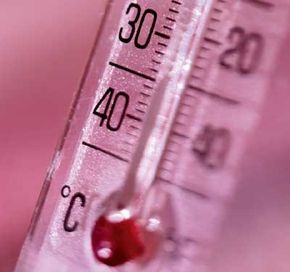Fever is a good thing. It's your body's attempt to kill off invading bacteria and other nasty organisms that can't survive the heat. The hypothalamus, which is the body's thermostat, senses the assault on the body and turns up the heat much the way you turn up the thermostat when you feel cold. It's a simple defense mechanism, and the sweat that comes with a fever is merely a way to cool the body down.
It used to be standard medical practice to knock that fever out as quickly as possible. Not so anymore. The value of fever is recognized, and since a fever will usually subside when the infection that's causing it runs its course, modern thinking is to ride out that fever, especially if it stays under 102 degrees F in adults. If a fever is making you uncomfortable, however, or is interfering with your ability to eat, drink, or sleep, treat it. Your body needs adequate nutrition, hydration, and rest to fight the underlying cause of the fever.
Advertisement
There is quite a range in what is considered normal in body temperature. The body's natural temperature-control system, managed by a tiny structure at the base of the brain called the hypothalamus, generally keeps body temperature at an average 98.6 degrees Fahrenheit (measured orally). But the normal or usual body temperature for any particular person can naturally range a degree or two above or below that. What's more, an individual's body temperature can vary by a degree or more during the course of a day, with the lowest reading usually occurring in the early morning and the highest in the evening. Fever is not a disease in itself but simply a symptom of some other condition, usually an infection caused by a bacteria or virus. When such an enemy invades, white blood cells attack, releasing a substance called pyrogen. When pyrogen reaches the brain, it signals the hypothalamus to set itself at a higher point; if that new set point is above 100 degrees Fahrenheit, you have a fever.
Well, now you know where fevers come from. The next thing you need to know is how to take an accurate temperature. We have suggestions for choosing the best thermometer, as well as some helpful home remedies, in the next section.
For more information on conditions commonly associated with fever, try the following links:
- To see all of our home remedies and the conditions they treat, go to our main Home Remedies page.
- Fevers are an important aspect of your body's attempts to fight off illnesses. Herbal Remedies for Fevers won't actually help you fight a fever, but rather help the fever run its course.
- Find out how to prevent respiratory infections and stay healthy.
- Learn how you can prevent the flu, and keep your immune system strong.
- Read about great Home Remedies for the Flu, and get great ideas on helping yourself heal.
This information is solely for informational purposes. IT IS NOT INTENDED TO PROVIDE MEDICAL ADVICE. Neither the Editors of Consumer Guide (R), Publications International, Ltd., the author nor publisher take responsibility for any possible consequences from any treatment, procedure, exercise, dietary modification, action or application of medication which results from reading or following the information contained in this information. The publication of this information does not constitute the practice of medicine, and this information does not replace the advice of your physician or other health care provider. Before undertaking any course of treatment, the reader must seek the advice of their physician or other health care provider.
Advertisement


